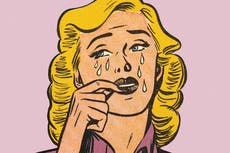Karens, ‘The Ben Stage’ and what happens when your name is ruined by the internet
As relationship gurus on TikTok warn women off dating men named Ben, Ellie Muir speaks to people whose names have become shorthand for unattractive – or even racist – behaviour


Never date someone called Ben,” cautions a young woman. “Save yourself. If you’re dating a man named Ben, you better run.” Currently dominating relationship videos on TikTok is something known as “The Ben Stage”, an apparently sincere bit of dating advice in which heterosexual women urge other heterosexual women to never, ever date someone named Ben. If they do, the trend claims, they’ll face dire consequences. “My Ben stage put me in therapy,” one person writes in a video comment section. “My Ben stage caused permanent trust issues,” insists another.
Unfortunately for Bens, they’re being connected to bad behaviour in relationships by mere coincidence – and the fact that Benjamin has been a popular baby name every year since 1996 according to the ONS. So, no, Bens aren’t on a mission to wreak havoc on straight women’s dating lives – they just happen to be everywhere. Still, Bens themselves are upset.
The first time 27-year-old Benjamin Jorgensen saw “Ben stage” videos on TikTok, he brushed them off. “[The] second time, I was angry and confused, but again, kind of ignored it,” he tells me. Then, his friends started mentioning the trend to him. “The Ben Stage” was growing. “Now everyone I meet will potentially have a pre-conception of who I am based off my name alone.”
Ben Thornberry, an 18-year-old part-time gardener, also feels that Bens are being misjudged. “I want people to know that Bens are not all bad people,” he says. “And what these people refer to as red flags in Bens, like being toxic, are not necessarily [commonplace] just because it’s happened to one person.” Though neither Ben tells me whether their romantic fortunes have been drastically altered by the trend, they’re clearly worried about potential long-term damage. Could “The Ben Stage” carry enough weight to permanently tarnish Bens for good?
This wouldn’t be the first time a common name has been smeared via meme culture. Social media has been responsible for the ridiculing of men named Chad (a stereotypical alpha male), young women named Becky (slightly basic white women who love pumpkin spice lattes and Uggs) and, most notoriously, middle-aged women named Karen (we’ll get to that shortly). Thousands of people unfortunate enough to possess one of these names might have to grapple with jokes made at their expense. But it’s debatable whether they’ve suffered real consequences as a result. Is being named Ben or Karen genuinely miserable in 2023?
Karen Van Hook is a 61-year-old voice coach from near Boston, Massachusetts. In 2019, she noticed that people were making fun of her name online. The “Karen” meme depicted a photograph of a middle-aged white woman with straw-blonde hair cropped in an asymmetric bob, alongside the text: “I would like to speak to a manager.” It went viral. As per the rules of the meme, a “Karen” is always white. She is over the age of 40. She shouts at baristas when her coffee order is wrong. She has a controlling, superior attitude. She demands to speak to the person in charge after every minor inconvenience. The meme caught on, becoming a catch-all for any middle-aged white woman who faces the world with entitlement and rudeness.
Van Hook discovered that there were other Karens out there equally confused by the meme – and even a support group on Facebook called Karens United. There, more than 2,000 women named Karen (or Karyn, or other variations on its spelling) were venting and debating what their name had come to symbolise. Van Hook joined after she saw jokes about Karens being anti-maskers (she herself wears a mask and has been shielding since the pandemic). When I first hear about the group, I’ll admit there was something slightly humorous about it. But after I speak to Van Hook, it becomes clear that they’ve been seriously affected by the meme and are desperately wanting to clear their names. “We got together to laugh about how we’re getting sick of these silly jokes,” she says. “But then, as it got more hateful, it became a more serious support group.” Van Hook assumed people would “snap out of it”. But they didn’t.
Van Hook tells me some of the stories she’s heard from Karens United members. Just last week, one woman named Karen gave her name in a bakery and was laughed at by the employees. Another was asked by a barista if she wanted to “change” her name so they didn’t have to call out “Karen” once her order had been made. “Some women are even considering a legal name change,” she says. One member has a three-year-old daughter named Karen. “And she’s hoping that the fad will pass before little Karen is old enough to know what’s happening.”
Tony Thorne, a linguist and lexicographer at King’s College, London, says that using names like Karen and Ben to “evoke abstract qualities or to conjure up a persona” is called personification. He says the characteristics of the Karen meme didn’t appear overnight. There was Amanda Seyfried’s dim-witted Karen in the 2004 teen comedy Mean Girls, while in 2007 the US comedian Dane Cook described a “friend nobody likes” named Karen during a stand-up special. “It was also mentioned as a sexist husband’s label for a separated, disliked wife in a 2017 Reddit thread,” he adds. Then there’s the “harsh” way the name sounds: “The initial sharp ‘K’ and the subsequent accented rushed syllable – it makes it a less-than-affectionate name to utter.”
Van Hook tells me she feels unfairly represented by the meme. “For one, I have long, brunette hair,” she half jokes. “The way people are using the name Karen is unusual,” she says more seriously. “The insult is that they pretend that the person they’re insulting is named Karen. Like, ‘Calm down, Karen’ or ‘Shut up, Karen’.” I ask her what she thought when “Karen” became shorthand for a racist person, as it did amid the Black Lives Matter protests of 2020 – and a number of viral videos in which white women were seen calling the police on innocent Black men. “I was shocked that something as serious and horrific as racism could be lumped in with jokes about managers and cats and people screaming over their lattes,” she says. “I don’t approve of that.”
Van Hook hopes that Bens won’t have to unite on Facebook as she and her fellow Karens have. “I definitely feel sympathy and some concern for Bens,” she says. “This kind of phenomenon can [be] whipped up into a seriously damaging thing. I think people are playing with fire when they turn our names into punchlines.”
I receive an email from Van Hook a day after we speak. She’s discussed “The Ben Stage” to some of her fellow Karens and they are apparently “horrified”. “Nobody wants to see this kind of abuse inflicted on anyone else,” she writes. “So far, none of the other name fads has blown up quite like the ‘Karen’ fad, but we don’t want to see anyone having to deal with any of this, on any scale.”
I ask Thorne if he thinks the “Ben Stage” will have the longevity of the Karen meme. “Linguists can never predict how long these fads will last or which ones will catch on,” he says. “But I’m guessing this is too niche to go global.” As for Karen, he says that they’d already begun to die out long before the meme became popular. “It’s now much less popular as a baby name than it was in the mid-Sixties, so as a demographic Karens are over,” he explains. “As a slur, the name has almost certainly already peaked. I’d be surprised if anyone uses it in this way after a couple more years.”
Clearly, it’s not pleasant to have your name maligned. But Bens and Karens are also typically protected by a layer of white privilege – the insults can only go so far. It’s unlikely these memes will affect their social or economic fortunes any time soon – distinctly “Black-sounding” names, however, are a different story. In 2021, amid a wave of criticism of the Karen and Becky memes, researchers from the University of California, Berkeley, and the University of Chicago sent 83,000 false applications for entry-level jobs to 500 different employers, using randomly assigned and racially distinctive names. They found that names like Jamal and Lakisha were called back for interviews 10 per cent less than names like Emily and Greg, despite all having comparable applications. It brings to mind that, for all the awkwardness of being giggled at in a Starbucks queue, it’s still not actual discrimination. And that for all the current mortification of being named Ben or Karen, it can only be short-lived.
Join our commenting forum
Join thought-provoking conversations, follow other Independent readers and see their replies
Comments


Bookmark popover
Removed from bookmarks